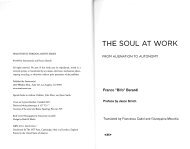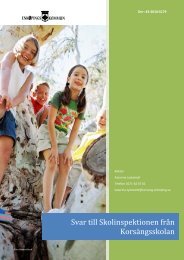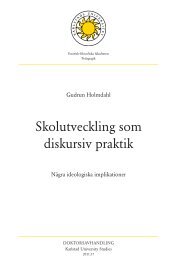FULLTEXT01
FULLTEXT01
FULLTEXT01
You also want an ePaper? Increase the reach of your titles
YUMPU automatically turns print PDFs into web optimized ePapers that Google loves.
individuals who, by reference to the same logic, seem to make these individualsappear as unfit or unsuitable parts of the school development enterprise. Anumber of texts denigrate specific characteristics, attitudes and identities, whileothers are idealized. To talk about others or about oneself in such categoricalway, seems to be an established part of the „school development‟ rhetoric.What is frequently used in the discursive practice are different concepts in formof codes, ready to merge with the first one than the other, who, according tothe alleged norm, may represent the supposedly undesirable or desirable traitsand codes of conduct in terms of school development. The term „informalleaders‟ or „saboteurs‟ are illustrative examples of the former. The phrasesbasically let understand some people as especially burdened by some criticalproperties e.g. unhealthy cultures which, in a paraphrase to Bauman (1999), areassumed to constitute a distortion and an obstacle to „a real „organization of theenvironment‟‟(p.17, own translation). Besides, this can also be interpreted asone among several examples of how subtly different categories of „dirt‟ aregenerated and established in the discursive practice.Ideological implications are also evident by the expectations expressed that„school development‟ must be carried out in a solid way, with an honestdisposition and a sincere manner. The authenticity of the ambition of thosewho engage in or commit to school development is emphasized as somethingfundamentally crucial. Furthermore it is proclaimed that some versions of whatschool are and perspective on how development in schools can be achievedwould be far more authoritative and enlightened than others. In accordance tosuch versions school is also portrayed as something extremely complex, and assomething almost impossible to understand, unless a special wisdom orexpertise concerning this complexity is adopted. There are also versions whichclaim that a supposedly true description of life at schools, and a trueconsciousness (in contrast to false descriptions or false consciousness), wouldallow for emancipation and some kind of wholesome development foreveryone.„School development‟ as a discursive practice seems in fact to have ideologicalimplications already by the concept itself, only by presupposing certain things,such that school would be in obvious need of development. Invalidation of theschool as it now is, implies that school would be the unfinished version ofitself, on which motion, regeneration and a sort of perpetual renewal, musttherefore continually be applied continuously and finally understood as naturaland normal. Versions of an almost religious character are also associated with183






